- Home
- Vince Flynn
Executive Power Page 2
Executive Power Read online
Page 2
Amazingly, the entire wedding had gone off without a hitch. Rielly couldn’t think of a friend who didn’t have at least one big blowout with her fiancé, or mother, or mother-in-law while planning her wedding. For her part, Anna had always clung to the romantic notion that one day she’d fall in love and have a big wedding back at St. Ann’s in Chicago. It was where her parents had been married, where she’d been baptized and confirmed and where she and her brothers had gone to grade school. But in the months after they got engaged she could see that this was an idea Mitch was less than enthusiastic about. It wasn’t that he was uncooperative. He told her that if she wanted a big wedding back in Chicago, that is what they’d do, but she could feel his apprehension. He didn’t have to state it.
Mitch Rapp did not like being the center of attention. He was a man who was used to working behind the scenes. The strange truth was that her husband had been a covert operative for the CIA since the age of twenty-two. And the harsh reality was that in some circles he was known as an assassin.
In the months before their wedding, during the confirmation hearing for Mitch’s boss at the CIA, a member of the House Intelligence Committee had leaked Mitch’s story to the press in an attempt to derail Irene Kennedy’s nomination as the next director of the Central Intelligence Agency. The president had come to both Rapp and Kennedy’s defense and a version of the truth was released to the media. The president told the story of how Rapp had led a team of commandos deep into Iraq to prevent Saddam Hussein from joining the nuclear club. The president called Rapp the single most important person in America’s fight against terrorism and overnight the politicians lined up to shake his hand.
Rapp had been thrust into the spotlight, and he didn’t do well. Having survived for years because of his ability to move from city to city, and country to country, without being noticed, he was now recognized virtually everywhere he went. There were photographers and reporters who hounded him. Rapp tried to reason with them at first. A few listened, but most didn’t. Not one to let a problem fester, Rapp arranged to have a few noses smashed. The others took the hint and backed off.
There was something else, though, that worried Rapp a great deal. He was now a marked man. Virtually every terrorist from Jakarta to London knew who he was. Bounties had been placed on his head and fat-was, Islamic religious decrees, had been thrown down by dozens of fanatical Muslim clerics across Arabia, Asia and the Pacific Rim. Thousands if not millions of crazed Islamic zealots would gladly give their lives to take him down.
Rapp worried incessantly about Anna’s safety and had even asked her if she was sure she still wanted to spend the rest of her life looking over her shoulder. Without hesitation she had said yes and told him not to insult her by bringing it up again. He had stoically honored her request, but it didn’t stop his worrying. He’d also taken some serious precautions, having ordered her a customized BMW with bulletproof glass, Kevlar-lined body, and shredproof tires. They were also in the process of building a house on twenty acres outside D.C. in rural Virginia. Anna had asked more than once where the money came from to pay for all this, but Rapp had always deflected her questions with a joke or change of subject. She knew he was a man of many means, and in the end she reasoned that there were some things she was better off not knowing.
When they sat down to plan the wedding, Rapp brought up a laundry list of security concerns that would have to be addressed. As the weeks passed, Anna began to realize that he simply would not be able to enjoy the day if they held such a large wedding. She made the decision then to have a small private ceremony with their families and a few close friends. The news had been received well by Mitch.
The event was held where they’d met. At the White House. Anna’s entire family, her mom and dad, brothers and sisters-in-law and seven nieces and nephews were there. Mitch’s only surviving relative, his brother Steven, was best man while Anna’s longtime friend Liz O’Rourke was the matron of honor. Dr. Irene Kennedy and a few of Rapp’s friends from the CIA were present as well as a select group of Anna’s media friends. Father Malone from St. Ann’s was flown in to officiate and the president and the first lady were the perfect hosts. President Hayes also used his significant clout to make sure there wasn’t a mention of the wedding in any of the papers or on TV. It was agreed by all that it would be wise to keep the identity of Mrs. Mitch Rapp off the front pages.
The guests all stayed at the Hay Adams Hotel, just a short walk across Lafayette Park from the White House. They celebrated well into the night and then the bride and groom were taken by the Secret Service to Reagan National Airport where they caught a private jet to their island. Courtesy of the CIA, they were traveling under the assumed identities of Troy and Betsy Harris.
Anna sat up and looked over the edge of the patio down at the beach. Her husband was coming out of the water after a swim. Naturally dark-skinned, after a week in the sun he looked like he’d gone native. The man was a prime physical specimen, and she wasn’t just thinking that because she was married to him. In his twenties he’d been a world-class triathlete who competed in events around the world. He’d won the famous Iron Man competition in Hawaii twice. Now he was in his mid-thirties, and was still in great shape.
Rapp sported some other physical features that had taken Rielly a little getting used to. He had three visible bullet scars: one on his leg and two on his stomach. There was a fourth that was covered by a thick scar on his shoulder where the doctors had torn him open to get at the bullet and reconstruct his shoulder socket. There was an elongated knife scar on his right side, and one last scar that he was particularly proud of. It was a constant reminder of the man he had sworn he would kill when he started on his crazy journey into the world of counterterrorism. It ran along the left side of his face, from his ear down to his jawline. The plastic surgeons had minimized the scar to a thin line, but more important to Rapp, the man who had marked him was now dead.
Rapp stepped onto the patio, water dripping from his shorts, and smiled at his bride. “How ya’ doin’, honey?”
“Fine.” She reached out her hand for him. “I was just dozing off a bit.”
Rapp bent down and kissed her and then without saying another word he jumped into the small pool. He came up and rested his arms and chin on the edge. “Are you ready to go back tomorrow?”
She shook her head and pouted prettily for him.
Rapp smiled. She really made him happy. She was smart, funny and drop-dead gorgeous. She could be a bit of a ballbuster at times, but he supposed any woman who was going to put up with him had to be able to assert herself or it’d be only a matter of years before he screwed everything up.
“Well, we’ll just have to stay a little longer, then,” he said.
She shook her head again and put the pouty lips back on.
Reaching across the patio for the bucket of iced Red Stripe, he laughed to himself. He’d called her bluff. She needed to get back to work or the network would have a complete shit fit. If Rapp had it his way she’d quit. The exposure was an ever increasing risk to her safety. But Anna had to come to that conclusion on her own. He didn’t want to wake up ten years from now and have her go nuts on him for making her throw her career away. His only consolation was that her current assignment at the White House meant close proximity to more than a dozen well-armed and supremely trained Secret Service agents and officers.
“Would you like a beer, honey?”
“Sure.”
Rapp opened one, handed the ice-cold bottle to Anna and then opened one for himself. Reaching out with his bottle he waited for his wife to do the same. The two bottles clinked together and Rapp said, “To us.”
“To us,” she replied with a blissful smile.
They both took a drink and Rapp added, “And lots of cute healthy babies.”
Anna laughed and held up two fingers.
Rapp shook his head. “At least five.”
She laughed even louder. “You’re nuts.”
“I never s
aid I wasn’t.”
They sat there basking in the sun, talking about their future for the better part of an hour, teasing each other playfully about how many kids they were going to have, how they were going to be raised, what names they liked and what they would do if one of the kids was as stubborn as either of them. Rapp refrained from sharing his opinion as she talked about what she would do with her job after they had a baby. It was one of those new things he’d learned about relationships. He understood that she was talking it out, and not looking for him to throw in his own two cents.
For her part, Anna kept her promise that she would steer clear of digging for details on the goings-on at Langley. Rapp knew that if they were going to survive in the long run he would have to share certain aspects of his job with her, regardless of what Agency policy dictated. Anna was too curious to spend the rest of their lives never discussing what he spent the majority of the week doing. The general subjects of terrorism and national security were fair game, but anything involving specific intelligence or covert policy was off the table. Having been silent for so many years, Rapp actually found it satisfying to be able to share his opinions with someone who had a decent grasp of the issues.
They opened two more beers and Anna joined him in the water. They clung to the edge of the gravity pool and looked out at the ocean, their elbows and chins resting on the edge, their legs gently floating behind them. They laughed about the wedding and their week of seclusion and avoided mentioning that it was about to end. Rapp could tell that Anna was getting tipsy. She weighed only 115 pounds and the combination of beer, warm sun and a lazy breeze meant a siesta was in the cards.
After a little while she kissed him on the lips and swam to the other end of the small pool. Climbing out, she stopped on the top step and pulled her hair into a loose ponytail. As she twisted it with both hands the water cascaded down her smooth back and over her tiny white bikini bottom. With a flirtatious glance over her shoulder she began to unhook her top. “I’m going to go take a nap. Would you like to join me?” Keeping her back to him, she slipped off her bikini top and draped it over the hammock hook to her right.
Needing no further encouragement, Rapp set his beer down and hoisted himself over the edge. He followed his wife into the bedroom, losing his swim trunks along the way. His eyes never left her body, and for a brief moment he found himself wishing they could stay on this tiny island forever.
When they got back to Washington it wouldn’t be like this. There would be fires to be put out and plans to be put into action. He watched Anna slip out of her bikini bottom, and the problems awaiting him in Washington vanished. They could wait, at least for another day. Right now he had more important things on his mind.
2
The black boat lay still in the water while Devolis took a quick fix with his handheld GPS. They were right on the mark, two miles off the coast of Dinagat Island in the Philippines. The men retrieved their night vision goggles (NVGs) from their waterproof pouches and secured them tightly on their heads. Thick clouds obscured the moon and the stars. Without the NVGs they’d be blind. On Devolis’s signal the boat moved out, the modified Mercury outboard engine no louder than a hum.
The powers that be in Washington had finally decided to make a move. Abu Sayyaf, a radical Muslim group operating in the Philippines, had kidnapped a family of Americans on vacation, the Andersons from Portland, Oregon. The family, Mike and Judy and their three children—Ava, nine, Charlie, seven, and Lola, six—had been plucked from their seaside resort on the Philippine island of Samar five months earlier.
Devolis and his men had followed the story closely, knowing that if the politicians ever got off their asses, it would most likely be their job to go in and rescue the Andersons. Devolis had spent a lot of nights thinking about the family, especially the kids. The twenty-eight-year-old officer wanted to rescue those kids more than anything else he’d wanted in his six years as a U.S. Navy SEAL. He’d stared at their pictures so often the edges were worn and brown, and read their files over and over until those innocent little faces visited him in his sleep. For better or worse this mission had become personal. He wanted to be their savior. With Devolis it was not false bravado but an honestly and fiercely held conviction that someone needed to show these fanatics what happened when they screwed with the United States of America.
Devolis was in no way sadistic, but he felt an unusual amount of hatred toward the men who were holding the Andersons. He couldn’t grasp what type of person would kidnap innocent children, but whoever they were, Devolis felt confident that he would lose no sleep over whacking the whole lot of them. Tonight Abu Sayyef was going to feel the full force of the U.S. Navy and the terrorist group would deeply regret having locked horns with the world’s lone superpower.
The USS Belleau Wood was lurking fifteen miles off the coast of Dinagat Island. The Tarawa-class amphibious and air assault ship could bring to bear an immense amount of firepower. One of five such ships in the U S. Navy’s arsenal, the Belleau Wood was the air force, army and navy rolled into one. She was a hybrid aircraft carrier and amphibious assault ship with an 800-foot flight deck. She carried six AV-8B Harrier attack jets, four AH-1W Super Cobra attack helicopters, and for troop transport, twelve CH-46 Sea Knight helicopters and nine CH-53 Sea Stallion helicopters. The 250-foot well deck in the stern of the ship held the navy’s superfast 135-foot, cushioned LCAC, capable of delivering heavy equipment, such as tanks and artillery, to the beach at forty-plus knots.
She carried a crew of 85 officers, 890 enlisted men and women and a battalion of 2,000-plus marines. The Belleau Wood provided true tactical integrity. Rather than waiting for various air force and army units to come together to form an integrated fighting force, the Belleau Wood delivered a complete self-contained fighting unit to the hot spot with air power, muscle, and logistical support all at the same time. She was the culmination of everything the marines and navy had learned as they clawed their way across the Pacific during World War II.
Devolis’s squad was the advance element of the operation. Their job was to go in and recon the camp. Once they’d verified what the intel guys had told them, they were to set up a blocking position between the main opposing force and the hostages and call in the doorkickers. Because of this they’d left their suppressed MP-5s back on the Belleau Wood, sacrificing stealth for firepower. Six of the eight men were carrying the M4 carbine, an undersize version of the venerable M16. With a shorter barrel and collapsible butt stock the weapon was much easier to maneuver through the thick jungle. The squad’s machine gunner was carrying an M249 SAW and the sniper was carrying a customized silenced Special Purpose Rifle. When the shooting started it would be very noisy, but for tonight’s mission, this would be a plus. The noise created by Devolis’s squad would both shock and disorient the opposing force as the helicopters swooped in from above and disgorged the assault teams.
Three more squads of SEALs, twenty-four men total, would then fast-rope in from above and both secure the hostages and sweep the camp. From there the doorkickers would move the Andersons one click from the camp to a small clearing for a helicopter evacuation. The clearing would be secured by a platoon of Force Recon marines, and if things started to fall apart and they met more resistance than they’d planned, the Harrier attack jets and Super Cobra attack helicopters were on station for quick deployment.
The squad would remain until the rescue element was safely out, and then work their way back to the beach and exfiltrate the same way they’d come in. A pretty straightforward plan, with one exception: they would be operating in the backyard of one of their allies and the Filipinos weren’t going to be involved in the operation. Not only were they not going to be involved, they weren’t even going to be told it was going on. No one had told the SEALs why, but they had their suspicions. The Philippine army had been promising for months to rescue the Andersons and they hadn’t done squat. There were rumors working their way around the teams that our old Pacific allies could no longer
be trusted, so the United States was going to take care of things on its own.
Devolis had learned early on in his career to steer clear of diplomatic and political questions. They tended to cloud the mission, which for a SEAL was a very bad thing. Mission clarity was crucial for a Special Forces officer. Besides, all that stuff was way above his pay grade. It was for the hoity-toity crowd with all their fancy titles and degrees.
Despite knowing better, Devolis couldn’t help but wonder how some of this might affect the mission. The scuttlebutt was that some pretty heated debates had taken place in Washington before they green-lighted the rescue operation. A rivulet of sweat dropped from his left eyebrow and landed on his cheek. He pressed the sleeve of his jungle BDU against his forehead and mopped his face. Silently, he cursed the heat, knowing that if it was warm out here on the water, it would be completely soupy in the jungle.
As they neared the beach, the boat slowed and settled in the calm water. There was only about fifty feet of sand between the waterline and the jungle. Every pair of eyes in the little rubber boat scanned the beach and the thick jungle in search of a sign that they weren’t alone. Even with their night vision goggles there was nothing much to glean beyond the empty beach. The jungle was too thick. Insertions were always a tense part of the op, but for tonight, at least, the intel guys had told him that it was highly doubtful they would meet any resistance upon landing.
A large, mangled piece of driftwood sat at the water’s edge. On Devolis’s order the boat headed in its direction. Unless it had moved since this morning’s satellite photographs, that was their spot. Just to the right of it, and in from the beach approximately a hundred yards, was a shallow stream they would use to work their way inland to the camp.
The boat nudged onto the sand beach, just to the right of the driftwood. The men moved with precision and speed. This was where they were most vulnerable, here on the beach out in the open. They spread out in a predetermined formation that they’d practiced with numbing repetition. The lead men in the front of the boat maintained firing positions while the others fanned out, creating a small secure beachhead that provided 180 degrees of fire.

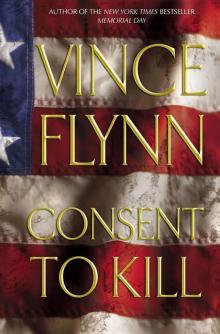 Consent to Kill
Consent to Kill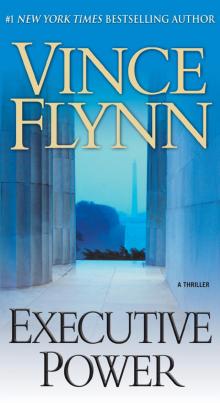 Executive Power
Executive Power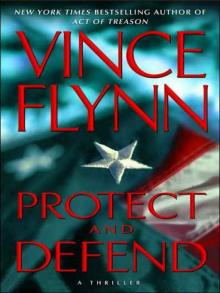 Protect and Defend
Protect and Defend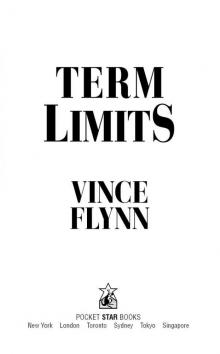 Term Limits
Term Limits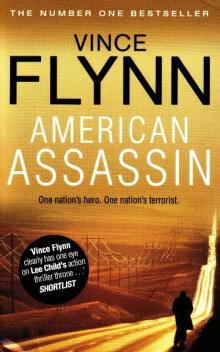 American Assassin
American Assassin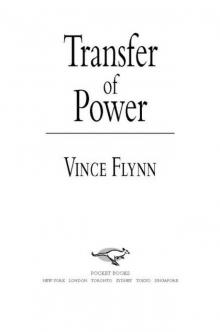 Transfer of Power
Transfer of Power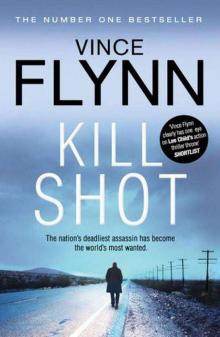 Kill Shot
Kill Shot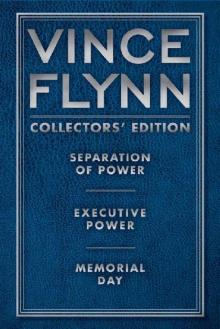 Vince Flynn Collectors' Edition 2
Vince Flynn Collectors' Edition 2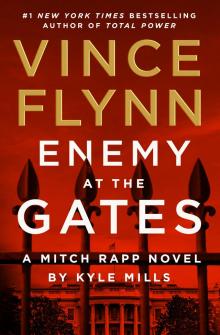 Enemy at the Gates
Enemy at the Gates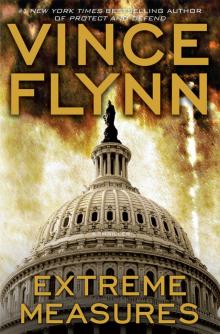 Extreme Measures
Extreme Measures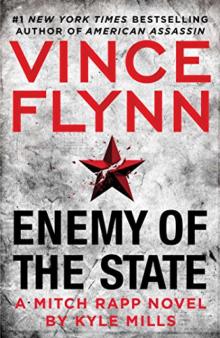 Enemy of the State
Enemy of the State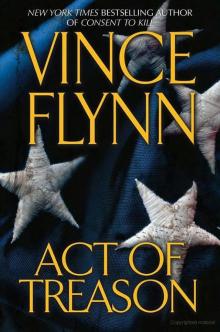 Act of Treason
Act of Treason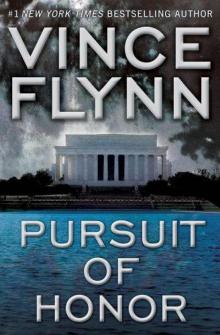 Pursuit of Honor
Pursuit of Honor The Survivor
The Survivor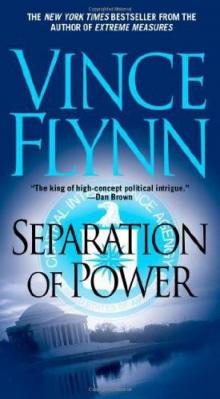 Separation of Power
Separation of Power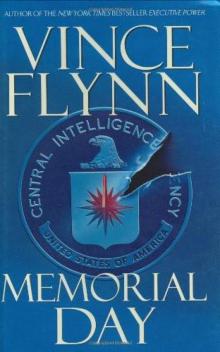 Memorial Day
Memorial Day The Last Man
The Last Man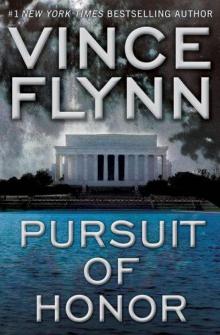 Pursuit of Honor_A Thriller
Pursuit of Honor_A Thriller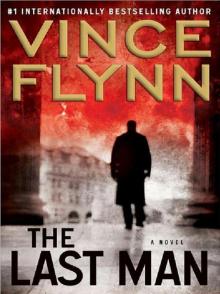 Mitch Rapp 13 - The Last Man
Mitch Rapp 13 - The Last Man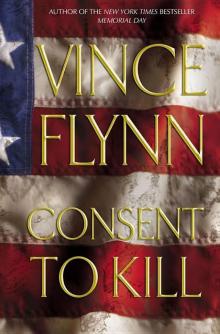 Consent to Kill:
Consent to Kill: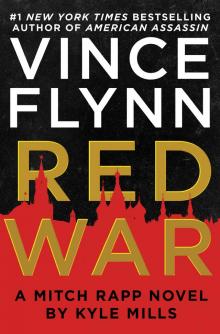 Red War
Red War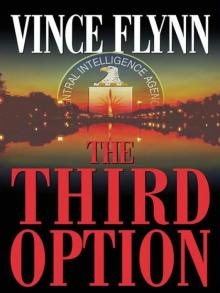 Mitch Rapp 02 - The Third Option
Mitch Rapp 02 - The Third Option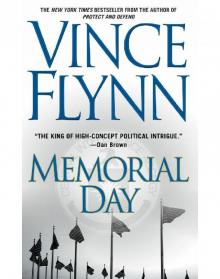 Mitch Rapp 05 - Memorial Day
Mitch Rapp 05 - Memorial Day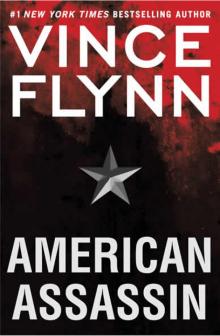 Mitch Rapp 11 - American Assassin
Mitch Rapp 11 - American Assassin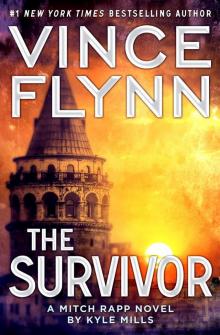 Mitch Rapp 14 - The Survivor
Mitch Rapp 14 - The Survivor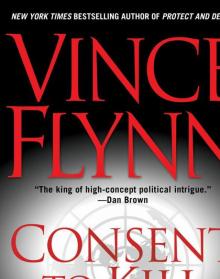 Mitch Rapp 06 - Consent to Kill
Mitch Rapp 06 - Consent to Kill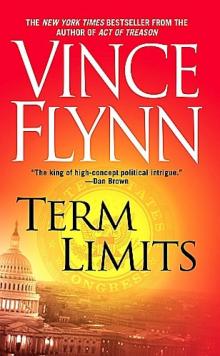 Term Limits mr-1
Term Limits mr-1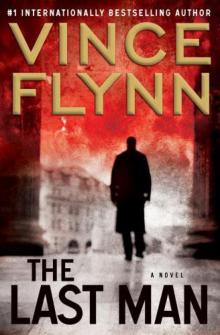 The Last Man mr-13
The Last Man mr-13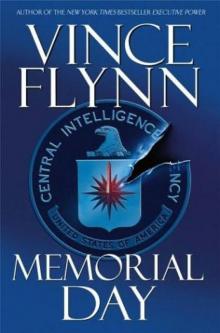 Memorial Day mr-5
Memorial Day mr-5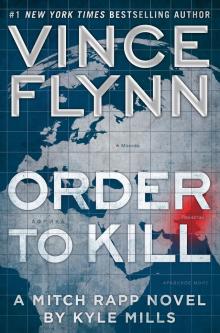 Order to Kill
Order to Kill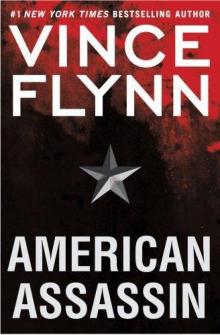 American Assassin: A Thriller
American Assassin: A Thriller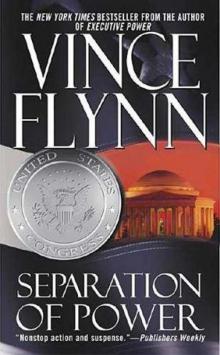 Separation of Power mr-3
Separation of Power mr-3